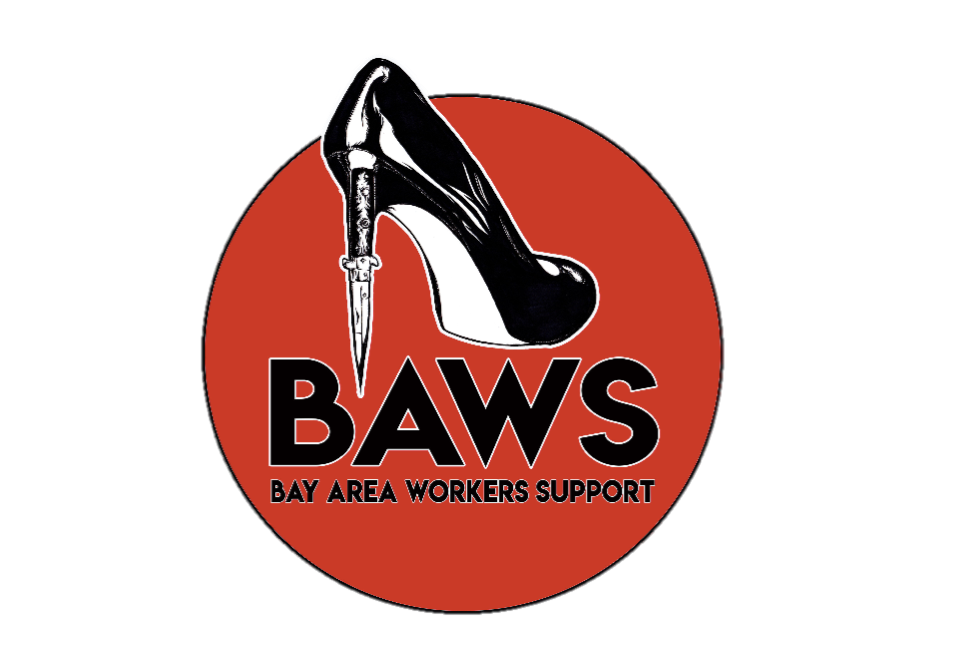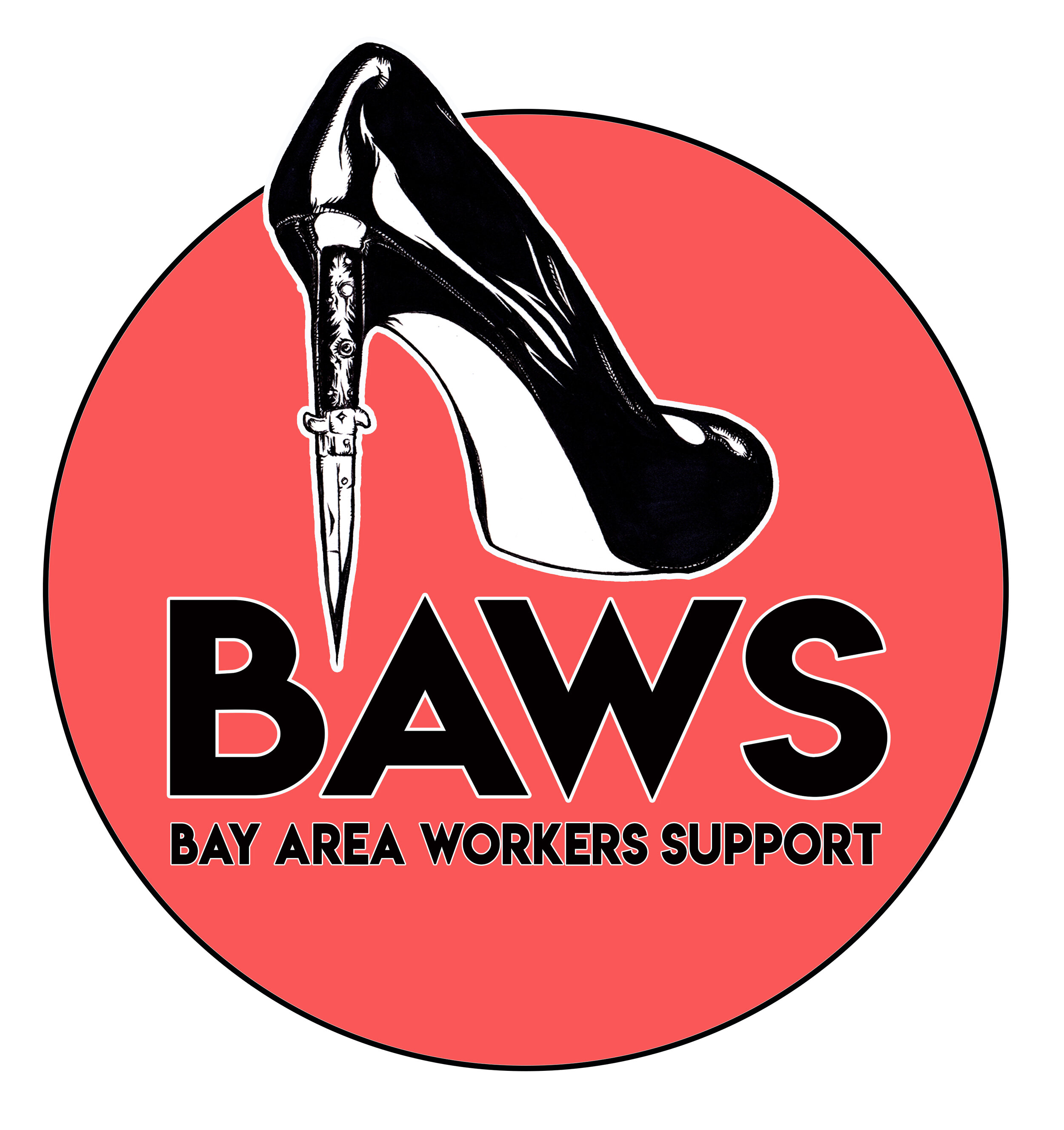Navigating COVID19 For Sex Workers & Allies: Info & Support Guide
Sex workers are having to make difficult decisions about our health and livelihoods. We want our communities to have accurate information and support to help navigate this pandemic and shelter in place. Below is health and resource information, based on harm reduction practices, geared for folks in the sex trade. We will require the love and support of our community to keep our Bay Area workers housed, fed, and cared for during this pandemic. Please share it widely.
This is a living document and will continue to be updated.
How to Support Sex Workers During COVID-19
Donate to BAWS’ Emergency Grant Fund so we can continue to provide financial relief for workers in the Bay Area tinyurl.com/BAWSupport
Ask to donate directly to your provider’s Venmo or Cash app
Many providers are pivoting to online or phone services: subscribe to our onlyfans, AVN stars, or niteflirt, book a private skype session
Purchase our online video content
Help a provider get tools to make video content (stand to hold a camera phone, lighting, etc)
Pre-pay for a session that you both can enjoy after COVID-19 passes
If you do decide to meet with a provider in person, please shower and wash your face and hands, use Listerine before and after. Let them know if you are having any symptoms. Please follow any new safety protocols your provider may be practicing
Donate clean blankets, warm jacket, umbrellas, money, clothes, hygiene supplies, food/grocery items, gift cards to St James Infirmary Clinic’s naughty nurse mobile. Call clinic to arrange to drop off stjamesinfirmary.org, (415) 554-8494
Say hello. Many of us are having a hard time dealing with social isolation, communal panic, and a loss of income. If you are not in a position to financially contribute, reaching out with words of support, encouragement, and funny memes can be meaningful. *Do not necessarily expect a response, many of us are dealing with a lot right now.
Reach out and check on your fellow worker right now. Ask if someone needs support or a friend to talk with. Everything is heightened and scary, let’s keep connecting with each other.
Why Physical distancing is important
Bay Area must stay in, ‘Shelter in place’ order expected on Tuesday, 3/17/20: sfchronicle.com/local-politics/article/Bay-Area-must-shelter-in-place-Only-15135014.php
Save lives, flatten the curve: medium.com/@ariadnelabs/social-distancing-this-is-not-a-snow-day-ac21d7fa78b4
MUTUAL AID & RESOURCES for sex workers (Bay Area)
Emergency Grants for Bay Area sex workers bayareaworkerssupport.org/grants
Bay Area Rising resource search page https://bayrising.org/covidhelp/ (avail in Spanish starting 5/20/20)
Resources for undocumented people in California https://covid19.ca.gov/guide-immigrant-californians/
Transgender District COVID-19 Relief Fund docs.google.com/forms/d/e/1FAIpQLScDfKWOFAJegRwgNtqw7xbJYR_QCQwTD038GFZyZRwzRrAcLw/viewform?vc=0&c=0&w=1
Stop your eviction twitter.com/mission_rad/status/1239316850158096385?s=19
What Oakland’s new eviction moratorium does (and doesn’t) do for renters, Posted on March 27, 2020, www.oaklandreporter.org
East Bay Disabled Folks COVID19 fund *prioritizing BIPOC docs.google.com/forms/d/e/1FAIpQLSc7LLhYN243k6xFlmQH26lAN9EoRXgEQGrghbqL8Ttc1K8YNA/viewform
ER Grants for sex workers, nationwide lysistratamccf.org/guidelinesforfundrequests
Trans Lifeline micro-grants translifeline.org/microgrants
Bay Area mutual aid tiny.cc/covidmutualaid
Alameda food bank accfb.org
Alameda SNAP food benefits alamedasocialservices.org/public/services/food_assistance/index.cfm *You can qualify for SNAP assistance even if you can not traditionally verify your income
Online mental health services for sex workers pineapplesupport.org
Peer Counseling at St. James Infirmary stjamesinfirmary.org/wordpress/?page_id=14
Trans Lifeline translifeline.org/hotline
SW Mutual Aid - NATIONAL & WORLD WIDE
Ongoing Twitter thread of mutual aid funds: twitter.com/marginalutilite/status/1239699723277172736?s=20
Diversifying your income
How to start an OnlyFans (Arabelle Raphael, 2020) twitter.com/ArabelleRaphael/status/1238549343717617664
Niteflirt Basics (Eva Sterling, 2020) docs.google.com/presentation/d/14JSHIVE8rsU2OE8kNtTvgSJrXxlE7Kj8MSuuqIFRPQ4/edit#slide=id.g716524f160_0_14
Intro to Camming (Vanessa Lierre Blue, 2020) twitter.com/vlierreblue/status/1238519912965922817?s=20
COVID financial survival (Amberly Rothfield, 2020) www.pornhub.com/album/52182251
Harm reduction practices if you must keep working to survive
Harm Reduction by POZ magazine: poz.com/article/practice-harm-reduction-age-covid19
Prevention Measures from the CDC: cdc.gov/coronavirus/2019-ncov/prepare/prevention.html
Ask clients about illness, travel, and exposure as part of your screening process
Do not see clients if they have signs of a fever, dry cough, difficulty breathing, headache, body-ache
Avoid clients who have recently been exposed to high-risk areas (Washington State, Bay Area, NYC, Italy, China, EU, and counting)
Do not discriminate against or stigmatize specific ethnicities when assessing risk for COVID-19
Avoid clients who have been exposed to people with symptoms
Ask all clients to shower, wash their face and hands, use hand & face wipes, use Listerine to not spread germs through your workplace or you
Wash your own hands before, during, and after time with a client
Minimize physical contact as much as possible, the coronavirus can be spread through kissing, coughing and contact with body fluids
Sanitize your work-place before and after clients
Think about possible exposure on your commute to and from work. Avoid touching bus, train, Lyft, door handles, railings as much as possible. Wear gloves & masks if possible.
If possible find alternative work methods
Know that you can spread the virus up to two weeks when you are a-symptomatic and for some that could be fatal
Remember, this will pass but it will take all of us to slow the virus down
STATE BENEFITS
In April Hacking & Hustling hosted a very helpful webinar about accessing state benefits for sex workers. This link will take you to the video of the webinar and below are links to resources mentioned.
Federal Stimulus (Put out by the IRS): New - Never existed before!
FAQs and webinar recording on economic stimulus payments for the LGBTQ community
Unemployment Office/Pandemic Unemployment Insurance Expanded AND new options for people who previously couldn't apply, which means a whole new process!
Federal DOL Page of Unemployment Insurance where you can find a link to your state's application/office
FAQ On Unemployment from NELP
SNAP (Food Assistance) Expanded for applicants but the same (unnecessarily challenging) process!
SNAP State Guide: https://www.fns.usda.gov/snap/state-directory
SNAP Eligibility Checker: https://www.benefits.gov/benefit/361
Alameda SNAP food benefits alamedasocialservices.org/public/services/food_assistance/index.cfm
*You can qualify for SNAP assistance even if you can not traditionally verify your income
***If you need food support, you can also find your local food bank
Health Care: Same process as before!
California is the only state which still has an emergency open enrollment period through June 30 for the state's exchange, Covered California. Medicaid (Always open) links by state
General:
LGBTQ Anti-Poverty Action Network COVID Resource List
Information on consumer protections and alternative tax prep options
NCLR Legal Helpline: 1.800.528.6257 or 415.392.6257
Legal Services if you run into problems (Federal Guide to finding your state-based resources)
Other info re: utilities, rent info, student loans, stuff on incarcerated loved ones (written April 7)
Mutual Aid resources for sex workers
VA and SSI recipients who don’t file a tax return and have dependents under 17 have to submit the information about those dependents by May 5th to get the additional $500 for each of those dependents this year. Sadly, the deadline for those receiving Social Security or Railroad Retirement Benefits who are in this situation has passed.
Specific to Immigrants and Migrants:
Information on the benefits discussed above for immigrants (Protecting Families)
Resources for immigrants during the pandemic (Informed Immigrant)
Other ways to support
Call your city representative and demand that they provide protection for under & un-housed people during COVID19 streetsheet.org/what-if-you-cant-stay-home/?fbclid=IwAR0Ic1rWs3RP89919YHNcjWIl_Kf5kLQmaF_Zhe5g6fQ9fzw94lKo69dlYw
Donate to or volunteer at your local food bank if you can accfb.org
Donate to your local blood bank redcrossblood.org/local-homepage/location/oakland-american-red-cross.html?utm_source=GMBlisting&utm_medium=organi (you get tested for COVID-19 when donating)
Provide direct aid for Bay Area residents experiencing hardships tiny.cc/covidmutualaid
Donate to moms4housing.org
Learn more about the privacy threatening EARN IT ACT going through congress right now and contact your representatives ASAP hackinghustling.org/earn-it-act/
Be kind to each other
What to do if you have symptoms
The following Covid-19 symptoms may appear 2-14 days after exposure: Fever, Cough, Shortness of breath, symptoms may vary (CDC 2020) cdc.gov/coronavirus/2019-ncov/symptoms-testing/symptoms.html
If someone gets sick, stay home and physically isolate. Most cases are mild. There is very little you can do at a hospital that you couldn’t do at home. But if symptoms are no longer manageable at home (trouble breathing, fever will not go down), you are older, autoimmune compromised, or have lung or cardio-vascular problems, read on. (UCSF Expert Panel, March 2020) tinyurl.com/qqsqwc8
Symptom management & supply needs tips from a Registered Nurse (RN @smashingteacups, 2020) tinyurl.com/t9gnj3r
Navigating COVID19 and chest binding (Jack Metcalf & Amelia Arnold, 2020) instagram.com/p/B9u0z_GBe05/?igshid=1vyi7bgnf0glu
Immunity & Food as Medicine ( Dr. Kristina Yotive DACM, L.AC) tinyurl.com/tjaaq2u
Health Basics & Herbalism (Vermont Center of Integrative Herbalism) https://docs.google.com/document/d/1mYHygY034TLAI-7E4xPQ5XWLSd2itIMJTvbfjSwY-lI/edit
Decolonizing Community Care Response to Covid- 19 (NDN Collective, 2020) ndncollective.org/indigenizing-and-decolonizing-community-care-in-response-to-covid-19/

